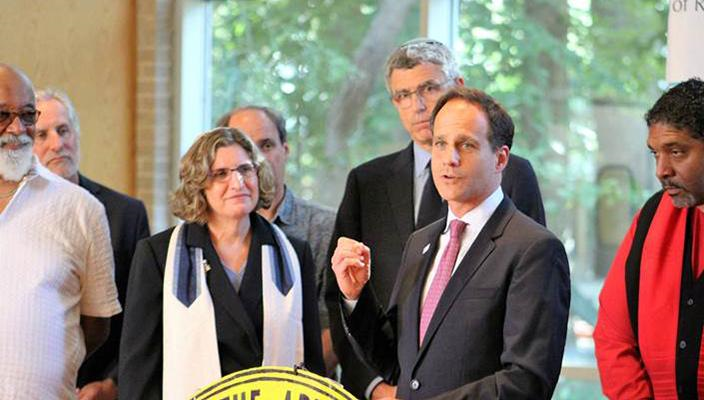(RNS) — Most of the time, when The New York Times mentions rabbis, it is in the “styles” section, as officiants in the wedding announcements.
But this week, rabbis were actually a front-page story. The New York Times reported that several major American rabbinic organizations are not going to participate in what has become an annual tradition — a conversation with the president on the eve of the High Holy Days.
The groups are: the Central Conference of American Rabbis, the Rabbinical Assembly, the Reconstructionist Rabbinical Association and the Religious Action Center of Reform Judaism.
Which is to say: all American non-Orthodox rabbinic groups.
They accused President Trump of having given “succor to those who advocate anti-Semitism, racism and xenophobia” with his comments after the bloodshed in Charlottesville.
At first, I was ambivalent about this decision. I was ambivalent because it effectively closed off any kind of communication between the White House and the non-Orthodox rabbinate.
But, on closer reflection, I understand and support the withdrawal from the White House High Holy Day call.
Because, how do Jews deal with political authority?
This week’s Torah portion is clear.
Kings had to follow certain rules:
- The king cannot have a lot of horses. The only reason to have horses was for military purposes. Therefore, there had to be some kind of arms control.
- The king cannot send people back to Egypt to get those horses. When it comes to Egypt — been there, done that. We ain’t going back.
- The king cannot have multiple wives.
- The king cannot amass huge riches.
- The king must write a sefer Torah — a copy of the Bible (or, perhaps just the book of Deuteronomy). The king is not the author of the laws. He is a student of the laws.
Translation: The king cannot be on a “power trip.”
Maimonides, the 12th-century Jewish sage, wrote:
The king must not exercise his authority in a ‘stuck up’ manner. He should deal graciously and compassionately with the small and the great, conduct affairs of state in their best interests, and respect the honor of even the lowliest. When he addresses the public, he shall use gentle language. (Mishneh Torah, Laws of Kings, 2:6)
Hey — don’t accuse me of “getting political.”
I’m just quoting Judaism.
So, that’s the Jewish thing. We hold rulers accountable for their actions.
- Pharaoh, in the Exodus story. To put it simply: We weren’t fans.
- Ahasuerus, in the Purim story. An idiot.
- King David. An adulterous murderer, who nevertheless had some major good qualities. We told it like it was.
- King Solomon. Yes, noted for wisdom. But, he was materialistic, and he had so many wives that they would have had to assign them their own ZIP code.
- King Ahab. A mess. A total mess.
- Roman emperors? Jerks.
And, in the United States?
- Richard Nixon. How many rabbis spoke out about Watergate?
- Ronald Reagan. He visited the Nazi cemetery at Bitburg. Even and especially the late Elie Wiesel ripped him for that — albeit gently: “Mr. President, that place is unworthy of you.” Many rabbis I know, including me, preached about that moment in American political history.
- Bill Clinton. See: peccadillos, presidential. I can show you piles of rabbinical sermons on that one.
- Barack Obama. How many rabbis criticized the Iran deal from the pulpit?
In other words, criticizing presidents, kings, emperors, temporal political power — it is what Jews do. It is what rabbis do.
The refusal to speak to, and therefore engage, Donald Trump might seem disrespectful of the office of the president.
I get that. I thought that, as well.
But, when thousands of rabbis — who lead the overwhelming majority of congregations in the United States — agree that this president’s equivocal, relativistic response to the Charlottesville horror was inappropriate, it means something. It means that for many rabbis, this presidency has crossed a moral red line.
How should American presidents respond to hatred?
Remember the first words that any American president said to American Jews.
When the Jews of Newport, R.I., wished George Washington a mazel tov on his inauguration, this is what he wrote back to them.
“For happily the Government of the United States gives to bigotry no sanction, to persecution no assistance, requires only that they who live under its protection should demean themselves as good citizens, in giving it on all occasions their effectual support.
You, dear reader, might disagree with the rabbinic organizations who decided to utter a loud “lo, todah!” (no thank you, in Hebrew) on the High Holy Day call. You might think that they are being disrespectful — not only of the president, but of the very office of the presidency.
Like I said: I get it. Reasonable people can disagree on what it means to show respect for a president, and for the presidency.
But if you disagree with those organizations because you found the recent remarks of the president to be nonproblematic, you might want to think about that more deeply.
And if you disagree with them because religious figures should not criticize political authority, then I am inviting you, gently, to join me in synagogue.
There, you will hear the words of the prophets, who were unyielding in their criticism of the societies in which they lived.
Those prophets are our role models, aren’t they?
Just sayin’.
(The views expressed in this opinion piece do not necessarily reflect those of Religion News Service)






